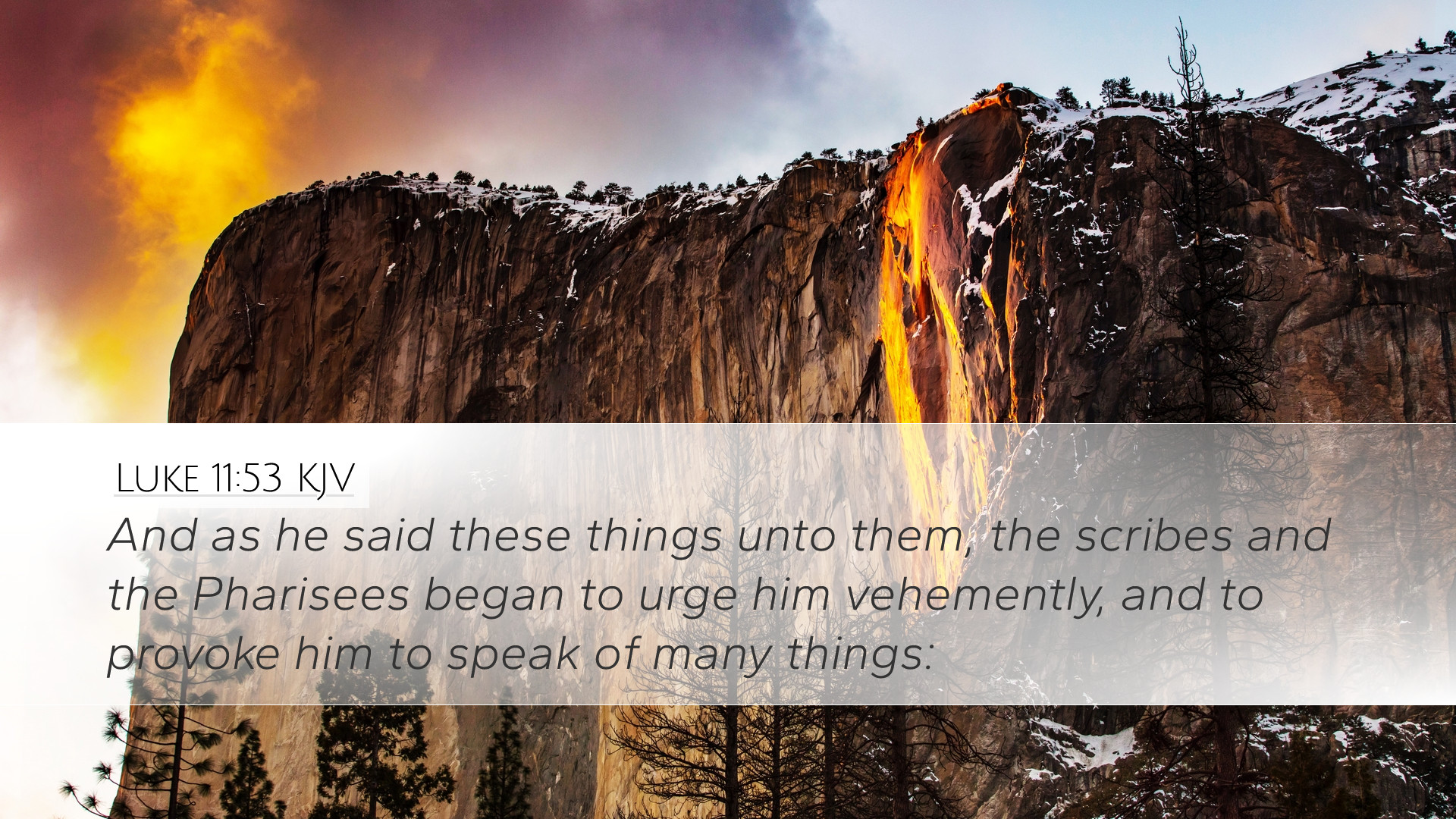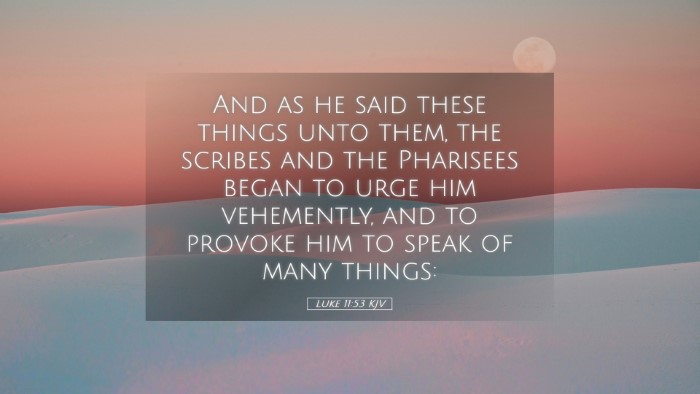Commentary on Luke 11:53
Verse Text: "And as He said these things unto them, the scribes and the Pharisees began to urge Him vehemently, and to provoke Him to speak of many things."
Introduction
This passage occurs during a significant moment in Jesus' ministry, wherein His confrontations with the religious leaders become ever more intense. As we delve into the public domain insights from commentaries by Matthew Henry, Albert Barnes, and Adam Clarke, we explore the implications of these actions by the scribes and Pharisees, the nature of the dialogue, and the theological significance embedded within this interaction.
The Context of Conflict
In the broader narrative of the Gospel of Luke, we observe a growing tension between Jesus and the Jewish authorities. The scribes and Pharisees represent the established religious order, dedicated to the interpretations of the Law and traditions. Their vehement urging of Jesus is indicative of their desire to challenge His authority and to entrap Him in His words.
Matthew Henry’s Insight
Henry emphasizes the overt hostility of the Pharisees, noting that their actions stem from a place of deep-seated jealousy and fear of losing influence over the people. They were not simply engaging in a theological debate but were actively plotting against Him, seeking to trap Him with His words and actions. This movement towards confrontation reveals much about the heart of religious legalism versus the radical grace of Jesus' message.
Albert Barnes’ Perspective
Barnes identifies the nature of their provocation as a strategic attempt to incite Jesus further. He posits that their questions likely aimed to highlight any contradictions in Jesus’ teachings or moral stances. This reflects a broader theme in the Gospels where Jesus, as a teacher of new truths, often found Himself at odds with the established interpretations propagated by the religious elites.
Adam Clarke’s Analysis
Clarke provides a detailed look at the motivations behind the Pharisees' actions, suggesting that their urgency to provoke Jesus was grounded in both a desire to discredit Him publicly and to protect their own religious authority. He notes that the term “urge vehemently” indicates both passion and aggression—a testimony to the intensity of their opposition.
The Nature of the Challenge
The scribes and Pharisees challenged Jesus not merely out of curiosity but as an antagonistic act. By pushing Jesus to speak on various subjects, they sought both to find fault with His words and to discredit His teachings among the people.
Religious Authority vs. Divine Authority
Central to this interaction is the conflict between human tradition and divine revelation. The scribes and Pharisees held strongly to their interpretations of the Law, while Jesus brought forth a new understanding that emphasized love, mercy, and the fulfillment of the Law through Himself. Their provocation can be seen as a desperate attempt to maintain control amid a shifting religious landscape.
The Implications for Today’s Believers
This passage remains profoundly relevant for contemporary believers. The opposition faced by Jesus serves as a reminder of the potential backlash that follows radical adherence to His teachings. The urgency of the Pharisees illustrates the challenge that contextually committed adherents to tradition may pose to those advocating for the transformative power of the Gospel.
Lessons on Leadership and Opposition
Pastors, students, and scholars can draw several vital lessons from this encounter:
- Perseverance in Faith: Jesus remained steadfast despite the provocation. This encourages today’s leaders to maintain their course in the face of opposition.
- Importance of Genuine Dialogue: Engaging with adversarial voices thoughtfully can lead to deeper understanding and growth in faith.
- Understanding Authorities: Recognizing the dynamics of religious authority can aid in fostering authentic community that embraces Jesus' message over institutional constraints.
Conclusion
In summary, Luke 11:53 encapsulates a pivotal moment in the life of Jesus, showcasing the growing tension between Him and the religious authorities. Through the insights provided by public domain commentators, we see a multifaceted portrayal of this confrontation. Their analysis sheds light on the enduring theme of conflict between tradition and divine revelation, with critical implications for the church today. Believers are encouraged to reflect on their own responses to authority and to uphold the radical grace of Jesus in a world that often resists such transformation.


